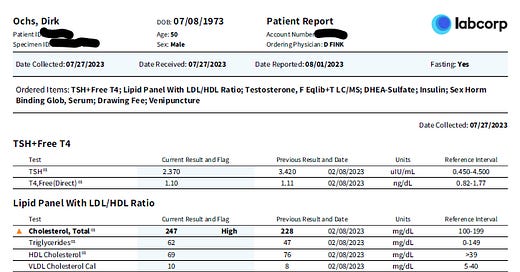I am not a doctor, scientist, or expert in anything. This content should not be construed as advice or recommendation, but is intended for entertainment and informational purposes only.
It’s been about 5 months since I reviewed my bloodwork in a post which you can read here, and as promised I have some updated results to share. Dr. Paul Saladino does this regularly on his podcast which is where I got the idea, and my reason for doing this is the same as his.
Namely, I want people to see real results after an intervention instead of a statistical compilation of suspect epidemiological data. Interventional studies are much different than what we usually see with dietary studies which are most often of the epidemiological/observational variety, and are based on information gathered from food surveys completed by participants usually in retrospective fashion.
Obviously this is not a RCT study and there is no comparison group, but I find it fascinating to actually see how my food and lifestyle choices impact my bloodwork. I also think this can be valuable for people who want to make changes, but are hesitant due to popular narratives that are rarely backed up by scientific data.
As always, I am not an expert and I’m not making any recommendations beyond the idea that a person should work with a good functional medicine provider who will do the appropriate bloodwork, and make lifestyle and treatment recommendations based on the results.
I didn’t do the more comprehensive bloodwork that I had done previously because I specifically wanted to see how some of my hormone levels changed. I did go ahead and get a lipid panel for the hell of it, and will probably do the full workup again in 6 months or so.
Below are the most recent results after 12 months on an animal-based diet which for me incorporates 1 gram of protein per pound of desired body weight from pasture-raised beef, pork, and, eggs, desiccated beef organ supplements, fruit, raw honey, maple syrup, and raw dairy.
First up are my thyroid numbers. You can see that my TSH levels dropped closer to the optimal target of 2.0 which means my thyroid function is improving. My Free T4 stayed about the same, and I’m shooting for 1.5 or higher on Free T4 so I still have some work to do.
Next up is the lipid panel. According to conventional medicine my total lipids and LDL are high, but I could give a rat’s behind. Why?
With the possible exception of people with familial hypercholesterolemia, there is no good evidence that lowering LDL or total cholesterol results in better health outcomes. Meta-analyses of statins and other cholesterol lowering medications show no significant improvement in health outcomes.
In fact, a study conducted by Ancel Keys, the father of the diet-heart hypothesis, showed that lower LDL resulted in worse health outcomes. This study was hidden from the public for decades and was found in one of his researcher’s basements when the family was cleaning it out after his death.
My HDL level is excellent, as are my triglycerides and VLDL. A better indicator of heart and overall health would be the fasting insulin score that we’ll get to in a minute.
Total testosterone dropped a little, but is still toward the top of the range. My free testosterone and percentage of free testosterone increased which are both positive indicators although I would like to get my percentage of free testosterone a little higher.
My DHEA-Sulfate lab was the one lab that went the wrong direction dropping to 83.1 from 92.7. This is a master hormone from which androgens like testosterone and estrogen are derived so I would like to see this number go up.
Fasting insulin was one that I was concerned about in my previous bloodwork post, but it turned out fine. Type 2 diabetes seems to hit the men on my dad’s side of the family (and probably the women too) so I was very conscious about my carbohydrate intake. I bought into the idea that carbohydrates drive insulin resistance and diabetes
Over the last 5 months I have increased my carbohydrate intake from around 50-75 grams per day to around 300 grams. To put this in a caloric context, that’s 1,200 calories per day from carbohydrate that comes primarily from fruit, raw honey, real maple syrup, orange juice, and raw milk.
My insulin reading improved, dropping from an already good 4.2 to an even better 3.8 signaling that my body is very insulin sensitive. Based on my results, I believe that Dr. Saladino is correct that something other than excess carbohydrates is driving insulin resistance and diabetes.
Some potential culprits would be linoleic acid found in high concentrations in seed oils (corn, cottonseed, canola, soy, sunflower, safflower) and high fructose corn syrup both of which are prevalent in highly processed foods and may cause metabolic dysfunction leading to insulin resistance.
Last but not least is Sex Hormone Binding Globulin (SHBG) which binds to testosterone and other sex hormones. A higher level of SHBG leads to lower free testosterone and my ideal target is 30. I still have a ways to go, but my SHBG dropped from 81.2 to 60 so I’m moving in the right direction.
Overall, the results from my bloodwork look pretty good. Until the next post, cheers to your good health!




Great job, Dirk! I have to ask, to what do you attribute the drop in your SHBG? Increasing your carbs (with fruits and honey)? I'm working on this myself after several years of keto/low-carb, and between my high SHBG and a possible thyroid issue (caused by keto?), I'm still searching for the right path.